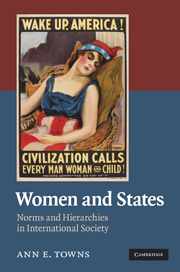Book contents
- Frontmatter
- Contents
- Tables
- Acknowledgments
- 1 Introduction
- 2 Constructivism and worldwide changes in state policy
- 3 A complex society of norms and social hierarchies
- 4 Excluding women in the society of civilized states
- 5 Women’s suffrage and the standards of civilization
- 6 National women’s policy bureaus and the standards of development
- 7 Legislature sex quotas and cultural rank
- 8 Conclusion
- Primary sources, by chapter
- Bibliography
- Index
3 - A complex society of norms and social hierarchies
Published online by Cambridge University Press: 05 October 2013
- Frontmatter
- Contents
- Tables
- Acknowledgments
- 1 Introduction
- 2 Constructivism and worldwide changes in state policy
- 3 A complex society of norms and social hierarchies
- 4 Excluding women in the society of civilized states
- 5 Women’s suffrage and the standards of civilization
- 6 National women’s policy bureaus and the standards of development
- 7 Legislature sex quotas and cultural rank
- 8 Conclusion
- Primary sources, by chapter
- Bibliography
- Index
Summary
This book starts with the premise that the international should be approached as a society in the sense of being social – constituted by inter-subjective knowledge and meaningful practices, and composed of arrangements of social relations among actors. International society, as patterns of organization of relations, is discursively constituted, structured and regulated by a multiplicity of norms, values and causal claims. I have no presumptions about international society being a singular and coherent system of meaning and relations within which all actors share certain common values. Instead, I leave the question about the complexity and diversity of international society open, to be investigated in the empirical analyses.
Norms are central components of international society. We may agree with the contention that “society means that norms regulate human conduct.” Adapting Katzenstein’s widely used definition, I use norms to connote social standards for the proper behavior of actors of a stipulated identity (with identity never being given but always in-the-making). A norm is thus not a mere generalization of regular practices but rather refers to recognition or knowledge of relations between specified behaviors and a stated identity. In other words, norms help set the terms for what can be said and done as a certain kind of actor. They also set out what has to be said and done in order to be regarded as a certain kind of actor. This process of connecting behavior with identity is inter-subjective, or socially shared. And the inter-subjective character of norms in turn means that the analysis of norms is not about seemingly subjective or private beliefs inside people’s heads. Like many other constructivists, I take an agnostic stance on private mental beliefs and motivations and let these remain outside the scope of analysis.
- Type
- Chapter
- Information
- Women and StatesNorms and Hierarchies in International Society, pp. 42 - 54Publisher: Cambridge University PressPrint publication year: 2010
- 1
- Cited by



